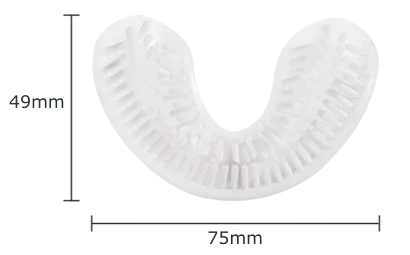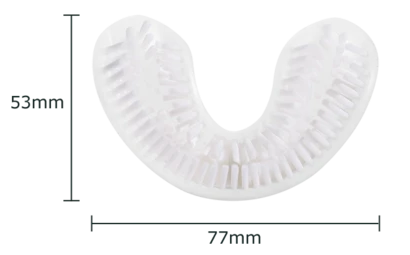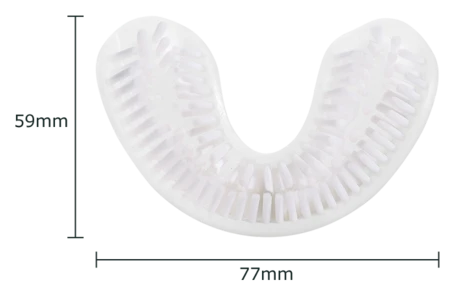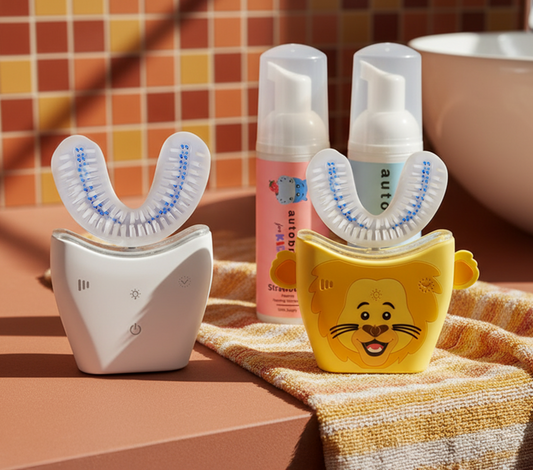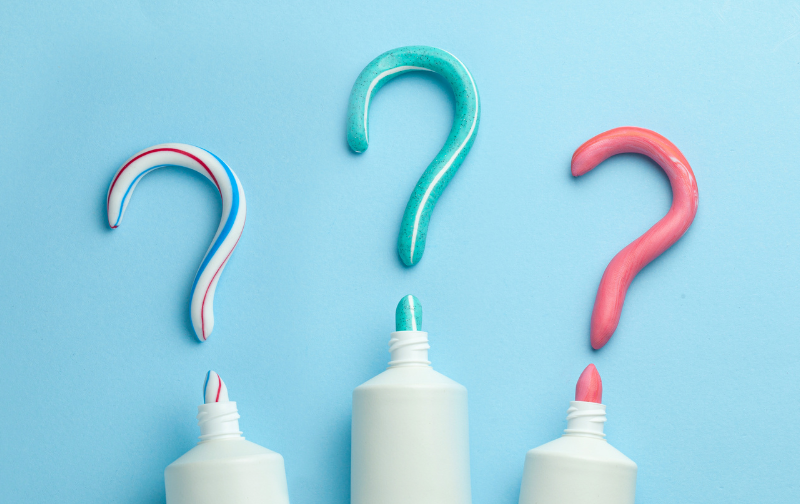
5 Natural Toothpaste Alternatives That’ll Brighten Your Smile
We’ve all been there - walking down the dental care aisle at your local grocery store, overwhelmed by the sheer amount of different toothpastes filling the shelves. All of them are seemingly different; some have charcoal, others have tiny whitening strips, and some claim to be all-natural. Yet they all claim to provide the same thing: a clean, white smile to put those Hollywood stars to shame.
But - what makes a toothpaste a toothpaste? Do different brands and types of toothpastes really make that much of a difference?
Let’s start by breaking down what toothpaste really is.
What is toothpaste?
Variations of what is considered to be toothpaste have existed for thousands of years – meaning humans have sought methods of keeping those pearly whites, well, white for a very long time now. Some of their methods were pretty effective and can still be used today.
All toothpastes contain two key components: abrasives and surfactants.
Abrasives
Abrasives are rough materials that aid the toothbrush in scrubbing debris such as plaque, tartar, and food particles from teeth. While these abrasives are great at polishing your teeth, be careful you don’t over do it. It’s recommended to use a soft bristled toothbrush and avoid applying too much pressure to make sure you’re not stripping away that important enamel on your teeth.
The most well-known toothpaste abrasive is sodium bicarbonate, commonly referred to as baking soda. Other abrasives include aluminum hydroxide, calcium carbonate, calcium phosphate, and silicas.
Surfactants
Surfactants are what makes your toothpaste get all nice and foamy - which actually has an important purpose. The foam helps those abrasives evenly cover your teeth to ensure you’re getting a proper brush.
This is what makes AutoBrush foaming toothpaste so effective. Foam toothpaste has a delicate formula that efficiently distributes to hard-to-reach areas, like in between the teeth to fight off plaque and odor-causing bacteria.
🦷️ Toothy Tip: Take the hard work out of your regular toothpaste and shop foaming toothpaste here.
Why you should brush your teeth

The buildup of plaque, tartar, and leftover takeout on your teeth can have adverse effects on your dental health. Plaque buildup strips away that important enamel leading to cavities and other dental health issues. If plaque is left on the teeth for several days, it turns into a yellow hardened substance known as tartar. This results in bad breath until its scraped off the teeth by a dental professional. Yuck!
Toothpaste Alternatives
Now that we’ve covered what toothpaste is and why it’s important to brush, let’s talk toothpaste alternatives.
Over the years, concerns have been raised over the safety of ingredients in toothpaste, including fluoride. If you have little ones then you probably know that fluoride can be toxic when ingested in large amounts. That’s why oftentimes families seek more natural, anti-cavity toothpaste substitutes.
If this sounds like you, we’ve got you covered. Click here to shop our kid-friendly anti-cavity foam toothpaste.
But maybe you’re the go-getter type that prefers to do things yourself or you simply ran out of toothpaste…
Here are our favorite natural toothpaste alternatives that will help keep your smile bright in a pinch.
1. Coconut Oil

From improving the quality of your hair to your skin, coconut oil holds many benefits for your body. Same is true for your teeth! When mixed along with baking soda, coconut oil is an effective toothpaste substitute.
Here’s a good recipe for DIY coconut oil toothpaste
Ingredients:
- 1/2 cup of coconut oil, softened
- 4 Tbsp. of baking soda*
- 2 Tbsp. of xylitol (or to taste)**
- 1/2 Tbsp. MCT oil
Recipe:
- Measure out your ingredients and add them to a large, wide-mouth mason jar.
- Using a hand blender, blend all the ingredients together until the mixture is fully blended and has become smooth and creamy. (Tip #1 - if you don’t have a hand blender, try melting the coconut oil beforehand and mixing with a whisk.)
- Pour the mixture into your preferred style of jar. (Tip #2 – Try using an array of colored lids to color-code your family’s jars.)
2. Sea Salt

Sea salt is another alternative to toothpaste. Salt is famous for its natural anti-inflammatory properties which is great if you are struggling with sore gums or toothaches. When diluted in water, sea salt can also reduce the acidic content in your mouth, balance you mouth’s natural pH level, and disinfect your mouth, tongue, and cheeks.
Here’s a simple recipe for an effective sea salt toothpaste:
Ingredients:
- 2/3 cup baking soda
- 1 tsp. fine sea salt
- Filtered water
- 1-2 tsp. organic arrowroot powder (optional - used as a thickener)
Recipe:
- Combine baking soda and salt.
- Add water little by little, stirring as you go. Keep this up until you have your preferred paste-like consistency.
- Need to make it a bit thicker? Add 1 to 2 teaspoons of arrowroot powder and stir to combine. Keep adding small amounts until you have the desired consistency.
- Store in a cool, dark place. (Lasts up to two weeks.)
3. Baking Soda

While baking soda is often required for delicious cake making, it’s also a prime ingredient used for teeth whitening. When mixed with water, baking soda’s alkaline properties help to break up plaque and clear up stains on your teeth.
Caution: It’s not recommended to completely throw out your toothpaste for this method, as it can damage your enamel with prolonged use. But tossing it into your regimen once or twice a week can have great benefits for your teeth.
Here’s a simple recipe for a baking soda toothpaste alternative:
Ingredients:
- 2/3 cup Baking Soda
- 2 Tbsp. Water
Recipe:
- Measure 2/3 cup of baking soda and add to your mixing bowl.
- Add 2 tbsp. water.
- Mix together until it turns into a paste.
🦷️ Toothy Tip: Skip the DIY and get results with AutoBrush’s teeth whitening kit. Get up to 6 shades brighter in only 10 days of daily use.
4. Charcoal

Much like baking soda, charcoal can help to whiten those pearls of yours. However, research into charcoal based toothpastes has found that prolonged use can cause some damage to enamel. Like baking soda, use this method sparingly.
Here’s a simple recipe for a charcoal toothpaste alternative:
Ingredients:
- 1/2 Teaspoon Activated Charcoal
- 2 Tablespoons Baking Soda
- 2 Tablespoons Coconut Oil
Recipe:
- Melt the coconut oil in a small saucepan or in a double boiler.
- Once melted, pour into a bowl and add the charcoal.
- Stir until desired consistency is reached.
- Pour the mixture into your preferred container and store in a cool, dry place.
🦷️ Toothy Tip: Fan of charcoal? Try our charcoal infused flossers to freshen up your mouth.
5. Wasabi

We know what you’re thinking, and no, this isn’t an out of season April Fool’s joke. Wasabi has very positive effects on the human body, including: improved digestion, antibacterial properties, and can help restore the alkalinity in your mouth. So, if you can handle the spice, consider giving brushing with wasabi a shot.
Final Thoughts…
Regardless if you prefer coconut oil or wasabi toothpaste alternatives, your toothpaste of choice should help you freshen up your mouth and remove lingering debris and bacteria from your teeth and tongue.
But what if you’re really in a pinch and can’t be bothered with an alternative? Simply wet your toothbrush with water or even wipe down your teeth with a damp washcloth to help remove plaque buildup. Something is better than nothing.
🦷️ Last Toothy Tip: If you are struggling with painful toothaches or chronic bad breath, be sure to reach out to your dentist asap for assistance.








